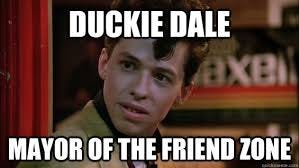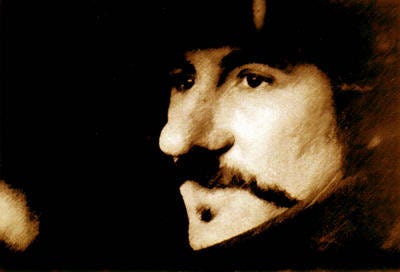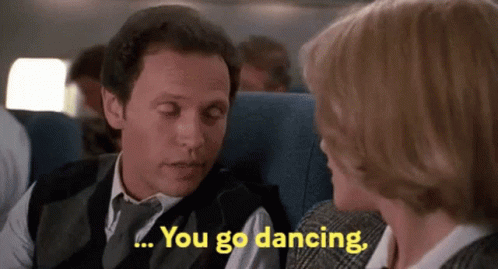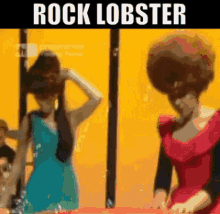
I was a freshman in college before I had my first real girlfriend.
I probably don’t have to add that this extended delay was not by design.
In high school, I’d never fit the physical mold that most teenage girls were attracted to. I was short, wore my hair in a mullet, had perpetual acne and dressed like an extra in the film Revenge of the Nerds. Trying to tame my raging hormones only made my belief — no, my certainty — that girls would never be interested in a boy like me all the more frustrating. I was shy, lacked confidence and knew I could never assume the cocky, assured poses of the taller, feather-haired, zit-free boys at school.
“Pretty in Pink,” the classic John Hughes teen comedy starring Andrew McCarthy and Molly Ringwald, had just hit the theaters. I identified with Jon Cryer’s lonely and hapless character “Duckie” so ardently that watching his struggles on screen felt like I somehow was being outed, that my insecurities around girls had not, as I’d hoped, been effectively disguised. I was the awkward teen with an unrequited crush on his female best friend. That Duckie gets paired off with a generic hot girl at the film’s end did nothing to assuage the feeling that I’d never be seen by girls through rosy, romantic glasses. It felt like a tacked on ending; an unrealistic fantasy demanded by test audiences who couldn’t bear watching Duckie at his prom alone, dancing by himself.
Like Duckie, I had been caught in the sticky-trap web of girls’ best friend. Always ready and available, at all hours, to listen to Amy or Shelly or Cindy vent about how Adam or David or Brad acted like such a selfish ass, how their boyfriends only wanted sex, how they never ever listened to them.
“I wish Adam could be more like you, Steve,” Amy Nelson whispered to me as I held the phone’s receiver to my ear under the bedcovers, its spiral cord stretched as far as it could reach from it’s base on my bedroom desk. It was almost 2am on a school night, but I wasn’t tired. Talking to Amy was like having a girlfriend without all the messy kissing and making out and heavy petting stuff.
“What do you mean?” I said, trying to coax a compliment.
“Sensitive. In touch with their feelings. In touch with my feelings.”
I knew that the last thing Amy wanted was for her boyfriend to be more like me. Even though I was inexperienced in the ways of sex and relationships, I felt certain that most girls did not want a passive, awkward, listener boyfriend. I was fully aware that I was merely the equivalent of one of Amy’s girlfriends, but with the added bonus of her believing I could provide her with the elusive guy’s perspective.
“I know Adam really likes you,” I whispered, trying to assuage her doubts about Adam’s seriousness as a boyfriend. “He’s told me as much. He’s just not so good with words.”
I was actually less Duckie and more Cyrano de Bergerac, writing love letters for the word-challenged, generically handsome dolt, all along wishing I could sign my own name at the bottom of the page. Living vicariously was better than not living at all, right?
“Steve, you’re gonna find the perfect girl someday,” Amy would say whenever the subject ever switched back to me, which was rare. “You’re one of the good guys.”
This did not comfort in the slightest. Good guy meant nice guy and nice guys finished last.
But other than being a good listener, I had one more thing in my favor.
I liked to dance.
Most teenage boys, or at least the ones I knew, considered dancing with girls a necessary evil that would hopefully lead to makeout sessions in the back seat of their car. They would stand on the dance floor, move their limbs around a little, do the white-man’s overbite and pretend to be into it for a song or two at most.
I never went to my Junior or Senior prom, but I did attend dances that were organized through my Jewish youth group chapter, for which I happened to be social chairman. We’d hold fundraising dances a couple times a year and invite teens from other chapters in the wider Los Angeles area and often a couple hundred kids would attend. As social chairman, I was able to influence the DJ’s song selection, suggesting my favorite danceable new wave records, like New Order’s “Blue Monday,” Billy Idol’s “Dancing with Myself,” and Joe Jackson’s “Steppin’ Out.”
Since most of the songs I’d chosen were fast-paced, having a partner to dance with wasn’t necessary. There was no need for nervous sauntering up to a girl across the room and trying to ask her to dance above the thumping bass of the music.
I’d simply join the masses on the floor, feel the music seep into my skin and bones and muscles and ligaments, and let biology take its course. All the self-consciousness and doubt that consumed me throughout the majority of my waking hours was gone; I had the music in me and I didn’t hold back. I’d sink, “down, down, down” as Fred Schneider demanded in The B-52s classic “Rock Lobster,” rising back up as the song’s iconic surf-inspired guitar line chimed back in. I’d spin on my toe in a perfect, tight circle, as Berlin’s smoky electro-dance hit “Metro” filled the dance hall. I’d twitch and jerk uncontrollably to the Talking Heads’ “Once in a Lifetime.”
Usually at these dances, the ratio of girls to boys on the dance floor would be around 5 to 1. I’d take advantage of this imbalance by spreading myself around, giving each girl a few seconds of my attention before flitting off to the next. As Robert Smith of The Cure would sing, it was “Just Like Heaven.”
But at the end of the night the music would fade and the harsh fluorescent lights would flick back on and I’d be driving home by myself, sweaty and awkward, with a crate of records in my trunk, wondering if I should just accept the fact that I would be alone forever. Oh, the extreme feelings and emotions of adolescence. How I don’t miss them.
Thankfully, there was music to get me through those hormonally challenging times. I could always find a song that resonated with me for every type of inner turmoil. Loneliness. Heartbreak. Anger. Confusion. But there was one song in particular that spoke loudest to the sad, teenage boy who never had a girlfriend, who struggled to find his footing while watching all his friends pairing up.
Whenever I would feel especially depressed about my solo status, I knew I could play one album —Joe Jackson’s “Look Sharp”— and one song in particular: “Happy Loving Couples.”
The song starts off with a loose upbeat reggae groove — bass, drums and sharp guitar— before Joe joins in:
I’ve just been to see my best friend
He’s found another girl
Says she’s just about the best thing
In the whole damn world
And in the next verse the music kicks up, becomes more urgent:
And he says can’t you see what the little lady’s done for me
Says it like he thinks I’m blind
But the things that you see ain’t necessarily the things you can find
Joe’s narrator doesn’t let the “poor me” tag stick. He doesn’t mope around feeling sorry for himself. He responds to his friend, then in later verses to his pressuring mother, and finally society as a whole, with a confident chorus:
But those happy loving couples make it look so easy
Happy loving couples always talk so kind
‘Til the time that I can do my dancing with a partner
Those happy couples ain’t no friends of mine
The song reassured me, as a virginal, awkward teenager that I didn’t need a “partner” to be whole. To be worthy. I also appreciated the snotty, self-protection attitude — those happy couples ain’t no friends of mine — as it helped me develop a thicker skin.
“Happy Loving Couples” would continue its musical-emotional influence over me for the next two decades, a supportive balm during my (many) periods of being single and feeling lonely. It was impossible to avoid the presence of cloying, happy loving couples and still maintain friendships, unless I planned to become a monk or a hermit.
Eventually I did finally join the ranks of the HLCs, and have been happily part of the club for almost eighteen years now. But I will always have a soft spot for the socially awkward, the outcast, the kids, teens and adults who struggle to find their place in the world. And their desire to have — or not have — a partner to share it with.
Want to be, want to really be
What my friends pretend to be/ Be it in my own good time
Being kind to myself
‘Til I become one of two of a kind






I was definitely always trying to “fit in” when I was younger. I was an introvert for sure. Music was always there for me. I was never one of the popular kids, but who wants to peak in high school anyway? 🤣
Hey Steve,
Finally got a chance to read some of your stories, great writing! This is very relatable to my own experiences as a teenager in high school, feelings of awkwardness and shyness. Lot of times I link my past experiences to songs also, I remember as a high schooler when I wasn't much of a doer but more of an observer. When I was a freshman and seeing some seniors across the quad, I would think about the song "IGY" by Donald Fagen, and the lyrics "what a beautiful" or "what a wonderful time to be free", thinking about what the future held as they left high school. When I got into a car accident in my high school's parking lot when I was a senior, I was really down and scared, but when me and the other driver found we were equally at fault, there was a song by Howard Jones at the time, "No One is to Blame", that struck a chord in me. In some ways these songs and others during my life really give me warm memories, and maybe a way to cope with the experiences I've had, some uncomfortable, some ok.